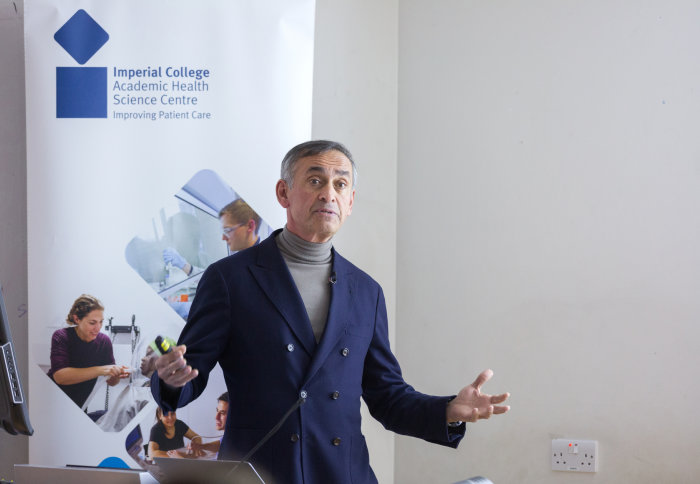Experts outline how robotic devices can transform surgical procedures

Robotic devices developed at Imperial are having a positive impact on surgical procedures, say researchers.
Robotic devices developed at Imperial are having a positive impact on surgical procedures, say researchers.
Professor Guang-Zhong Yang, director and co-founder of the Hamlyn Centre for Robotic Surgery at Imperial College London, and Professor the Lord Ara Darzi of Denham, director of the Institute of Global Health Innovation, and consultant surgeon at Imperial College Healthcare NHS Trust, presented their findings at the latest Imperial College Academic Health Science Centre (AHSC) seminar series event.
In a packed lecture theatre, Professor Yang shared his work on developing minitaurised medical robots such as the fibre-bot. The device access the body through tiny cavities and look for early signs of cancer.
Professor Yang outlined how his team are already working on a prototype for the fibre-bot, which would consist of a flexible hollow optical fibre that is controlled by a surgeon. They hope that it could ultimately enable surgeons to conduct endoluminal surgical procedures, where the robot is introduced into the body’s natural openings such as the mouth, anus or even through the milk duct to detect and treat conditions such as cancers that affect the breast, throat, lungs, and gastrointestinal system.
The potential advantage of the device would be that it could travel through tiny cavities and get to hard-to-reach places and look for early signs of cancers, delivering treatments through its hollow core in a targeted and minimally invasive way. The aim is to improve patient recovery times and ultimately their quality of life.
Professor Darzi outlined how devices developed at Imperial are making a difference to how surgical procedures are carried out. For example, a device that can image the kidney and show lesions, a region in an organ or tissue which has suffered damage through injury or disease, for the first time is now part of clinical practice.
Professor Darzi also outlined that new sensors developed at Imperial that can be placed inside a patient’s organ and measure their response to treatment will be trialled at ICHT’s hospitals. The sensors will be used on patients with rectal cancer to see how they are responding to radiotherapy. This will give clinicians a clearer picture of whether the patient’s tumour has become resistant to radiotherapy at an earlier stage so that other treatment options can be explored.
The seminar was the third of a new series designed to showcase the work of the AHSC, a partnership between Imperial College London and three NHS Trusts. It aims to translate world-leading discovery science into new diagnostics, devices and therapies as quickly as possible, for the benefit of patients and populations worldwide.
The next event will be on ‘understanding and treating allergies’ and will take place on Monday 19 March at the Royal Brompton Hospital from 12:00.
This talk will be delivered by Adnan Custovic, clinical professor of paediatric allergy at Imperial College London and honorary consultant at ICHT, and Stephen Durham, Head of section for allergy and clinical immunology at the National Heart and Lung Institute, Imperial College London.
Article text (excluding photos or graphics) © Imperial College London.
Photos and graphics subject to third party copyright used with permission or © Imperial College London.
Reporter
Maxine Myers
Communications Division
Thomas Angus [Photographer]
Communications Division
Martin Sayers
Communications Division
